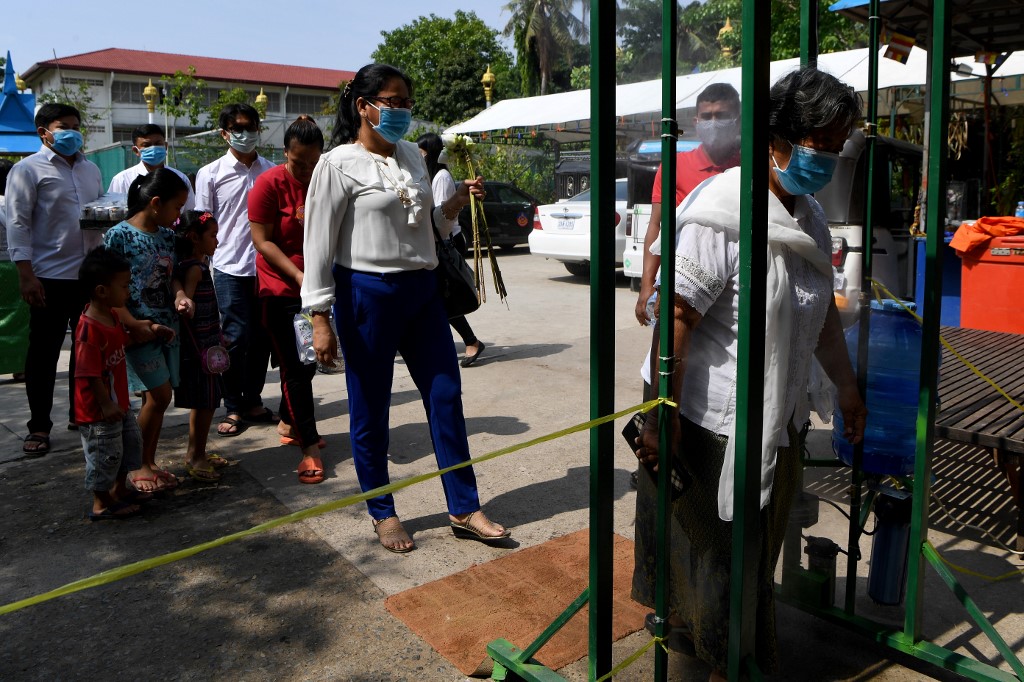PHNOM PENH, April 14 (Xinhua) -- Every year in the past, Saing Sochea, a 29-year-old Phnom Penh resident, brought food for monks at the pagoda to honor her faith in Buddhism during the Cambodian New Year, but this year, she couldn't do it due to the COVID-19 pandemic.

People wear face masks, amid concerns over a spread of the COVID-19 coronavirus, as they walk through a gate equipped with disinfectant spray for people entering a pagoda during the Khmer New Year in Phnom Penh on April 14, 2020. (Photo: AFP)
But she still prepared praying stuff such as flowers, candles, incense sticks and fruit to greet the New Year's angel at home in accordance with local tradition.
"We still celebrate the New Year, but at home with our family members," she told Xinhua on Tuesday. "As Buddhists, we have the Buddha in mind, our ancestors in mind, although we cannot go to the pagoda for prayers, we can worship them at home."
The government had cancelled the celebrations of the Cambodian New Year holiday, which started from Monday and will end Thursday, in a bid to prevent the spread of the coronavirus through mass gatherings and mass traveling. All state officials and private sector employees are required to work as usual on the occasion and they will be compensated with a five-day holiday in an appropriate time when the COVID-19 is over.
Sochea supported the government's move, saying that it was an effective way to curb the virus spread.
"My own and family's safety is the most important thing. This year, I could not go to the pagoda, but I can go anytime when the virus is over," the mother of three children said.
However, some people still go to the pagoda on the suspended New Year, though they fear the COVID-19.
"It's our tradition since ancient times to go to the pagoda during the New Year in order to honor our ancestors," a 27-year-old woman identifying herself as Dany told Xinhua at a pagoda in Phnom Penh on Tuesday.
"For the coronavirus, we are afraid of it, but we have our protective way, we come to the pagoda, we wear face masks and always bring along alcohol-based hand sanitizers," she said.
Buddhism is the state religion in Cambodia, where about 90 percent of the country's population of 16 million are Buddhists. According to the Ministry of Cults and Religion, the kingdom has more than 4,800 pagodas with nearly 70,000 monks.
Yim Chamroeun, the abbot of Sansam Kosal pagoda in Phnom Penh, said monks have less food this year due to the cancellation of the New Year celebrations.
Every year, huge crowds of Buddhists come to the pagoda. However, due to the COVID-19, there is about 70 percent drop in the number of people coming to the pagoda, he told Xinhua on Monday.
To date, the Southeast Asian country has recorded a total of 122 confirmed cases of the COVID-19, with 91 patients cured, according to the Ministry of Health.
Health Minister Mam Bunheng said on Monday that the country had so far tested more than 8,900 samples of suspected cases and had placed more than 2,200 people under quarantine.
"We urge people to stay at home and not to hold mass gatherings during this cancelled New Year holiday," he said.
He advised people to practice social distancing and good hygiene by frequently washing hands with soap, alcohol, or alcohol-based hand sanitizers, and covering their mouth and nose with a face mask when coughing or sneezing.
The minister called on migrant workers, especially those who just returned from Thailand, to self-isolate for 14 days and to contact a 115 hotline if they have any suspicious symptoms of the virus.
Currently, the Institut Pasteur in Cambodia (IPC) and the National Institute for Public Health (NIPH) are the only two labs that provide tests for the COVID-19 virus, he said, adding that the IPC and the NIPH can test about 500 samples and 100 samples, respectively per day.


